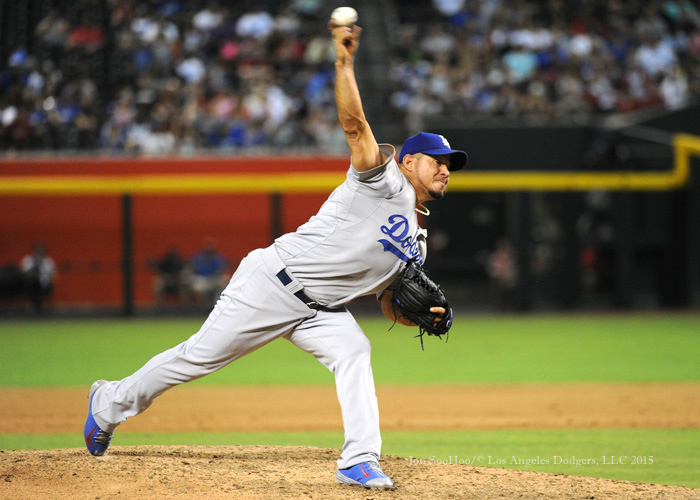When a Dodgers relief pitcher comes into a game with the bases load and gives up a grand slam home run on his third pitch, it’s easy to understand why Dodger fans get upset or even angry. After all, they expect a guy who is making a minimum of just over a half a million dollars and in most cases several million dollars to be able to accomplish their one job – get hitters out regardless of the number of baserunners they inherit. But as bad and devastating as a grand slam is in that situation, the simple truth is he is responsible for only one of those three runs.
It’s no secret that most Dodger fans see 39-year-old right-hander Joel Peralta as the weakest link in the Dodgers bullpen, and with good cause. His 4.15 ERA (yes, that’s only how high it is) is the fifth-highest of the seven relievers currently on the Dodgers’ 25-man roster. And while newcomers Jim Johnson and Luis Avilan both have ERA’s of 9.00 since joining the team at the July 31 trade deadline, their actual ERAs on the season are 2.39 and 3.72 respectively when you figure in their ERAs for the entire season while with the Atlanta Braves.
Ironically and what Dodger fans may not realize is that the three inherited runners that Peralta allowed to score on Maikel Franco’s first career grand slam were the first three inherited runners that Peralta has allowed this season.

While some are calling Dodgers right-hander Joel Peralta this year’s Brian Wilson, his actual numbers aren’t all that bad. (Photo credit – Jon SooHoo)
So if it’s not the bullpen that Dodger fans should be casting their stones at, who is it – or more accurately, what is it? A quick glance at Tuesday’s box score or the box scores from nearly every Dodgers loss this season will give you the blatantly obvious answer to this question – leaving runners on base and even more so, leaving runners in scoring position.
In Tuesday’s 6-2 loss to the Philadelphia Phillies – the team with the worst record in the MLB – the Dodgers stranded 13 base runners – THIRTEEN. But what’s even worse is that they were a pathetic 2 for 12 with runners in scoring position.
The Dodgers had runners on second and third with no outs in the third inning and came away empty. They then loaded the bases with no outs in the fourth inning and failed to push across even one run.
“We didn’t tack on runs when we had chances and you just hope that doesn’t come back to get you,” said Dodgers manager Don Mattingly after the game. “We didn’t put pressure on them, we left them in the game and that’s what can happen.”
Ya think?
On the season the Dodgers are leaving an average of 13.71 runners on base per game – 12th most in the National League. But to their credit, they are leaving an average of only 3.14 runners in scoring position per game – second fewest in the league. Their team batting average with runners in scoring position is .258 – which ranks sixth in the league. (Note: Howie Kendrick leads the Dodgers with his .349 batting average with RISP).
The head-scratcher to all of this is that the Dodgers lead the league with 131 home runs – 11 more than their division rivals the Colorado Rockies (hint – Coors Field). As such, you would think that they would leave far fewer runners on base. The reason, of course, is that they are hitting more solo home runs than home runs with runners on base.
But in spite of Tuesday’s agonizing loss to the lowly Phillies, and in spite of the grand slam allowed by Joel Peralta, the Dodgers are still in first place in the NL West; and that, after all, is what really matters.




 August 5th, 2015 at 7:30 am
August 5th, 2015 at 7:30 am  by Ron Cervenka
by Ron Cervenka  Posted in
Posted in 

To sum it up: Shit happens.
http://t.co/yIldSmwnrf
You didn’t have to convince me that the teams’ old Archille’s heel, the offense played a big part in last night’s loss. As the years go by this problem continues on.